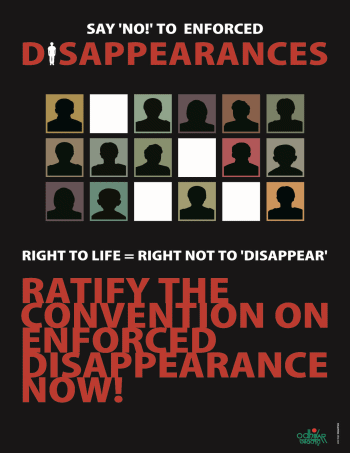A Joint Statement by Odhikar and the World Organisation Against Torture to commemorate International Day in Support of Victims of Torture 2021
BANGLADESH: Torture continues as perpetrators are rewarded
Dhaka/Geneva, 25 June 2021: Odhikar and the World Organisation Against Torture (OMCT)remember and pay tribute to victims of torture and stand in solidarity with the victims and their families on the occasion of International Day in Support of Victims of Torture (26 June).
The institutionalised practice of custodial torture by the law-enforcement agencies has created multiple crisis in the society of Bangladesh. Torture and ill treatment remain integral parts of the criminal investigation process, although the country’s police claim to be equipped with modern technologies. Magistrates who randomly grant the police request for remand for extended periods of time put detainees under risk of torture. Moreover, courts accept coerced statements as evidence in violation of Article 35 of the Constitution and of Bangladesh’s international obligations.
Criminalisation of torture has not contributed to the process of eradicating the practice of torture in Bangladesh, as the perpetrators enjoy impunity and rewards from the government. Partisan recruitment of prosecutors disregarding professional qualifications leads to poor investigations into torture cases and custodial deaths. Moreover, the continuous intimidation of complainants and their families by law-enforcement and intelligence agencies force victims to remain silent and prevent them from seeking justice. Since the enactment of the Torture and Custodial Death (Prohibition) Act-2013 only three cases are lined up for prosecution, while only one case has seen a conviction of three perpetrators at the trial court. Torture prevails due to deeply rooted culture of impunity.
Victims of torture consistently suffer from the trauma they experienced. The victims suffer from insomnia, nightmares, fatigue, loss of memory, lack of concentration and extreme forms of fear psychosis. The existing system of blocking the victims’ access to justice and threatening them and their families, further triggers deepened psychological problems. This also harms the victims’ families.
Despite investments into training and capacity building programmes by Bangladesh’s development partners, the human rights record of law enforcement agencies has not improved. Quite the contrary, crimes against humanity like enforced disappearance and torture have dramatically increased in recent years. Under an authoritarian regime, capacity building and training only led to more abuse.
Odhikar and OMCT believe that resources invested in the police must be coupled with support to human rights, rule of law and democracy. Thereby, universal access to justice and accountability for torture, enforced disappearances, and extrajudicial killings need to be the priority of the government of Bangladesh as well as its development partners.
——
Odhikar, meaning ‘rights’ in Bangla, is a registered human rights organization based in Dhaka, Bangladesh established on October 10, 1994 by a group of human rights defenders, to monitor human rights violations and create wider awareness. It holds special consultative status with the ECOSOC of the United Nations.
The World Organisation Against Torture (OMCT) is the main coalition of international nongovernmental organisations (NGOs) fighting against torture, summary executions, enforced disappearances and all other cruel, inhuman or degrading treatment. OMCT has more than 200 affiliated organisations in its SOS-Torture Network and many tens of thousands correspondents across the world.
Joint Statement on Bangladesh_OMCT_Odhikar (full text in English, PDF)




